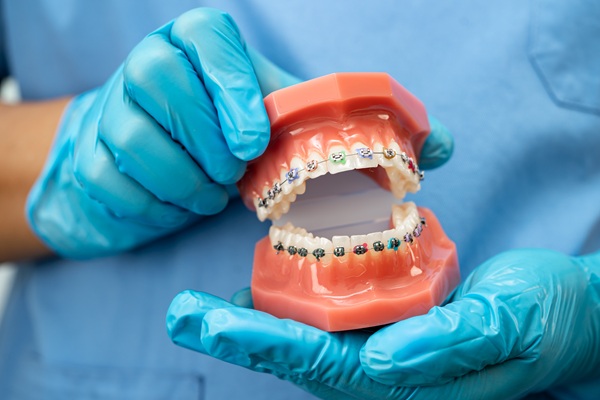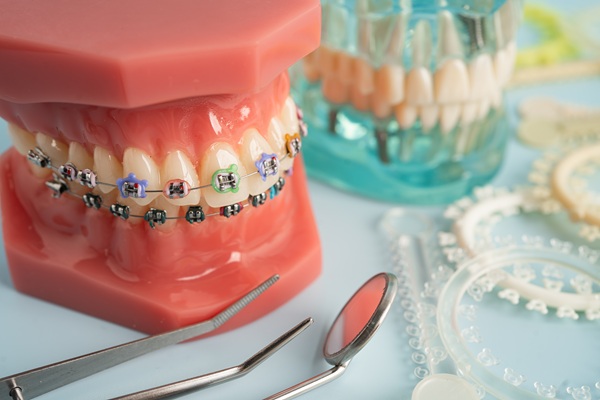When you have dental braces, one of its main purposes is to help straighten your teeth and improve your oral health. The end goal may take quite some time to achieve, but everything will be worth it once the wires and metals are taken out.
Whilst you wait for your teeth to straighten, your dentist will likely ask you to go back every month or every other month for adjustments. And during those sessions, you might have noticed that your dentist changes the rubber bands during your adjustment appointments.
Have you ever wondered why these rubber bands are replaced regularly?
The Role of Rubber Bands in Dental Braces
Before we learn about why the rubber bands in our braces are replaced, let’s take a moment to understand first what their purpose is.
The small rubber bands, often called elastics, are an essential part of your dental braces for a reason. They work in conjunction with the brackets and wires to guide your teeth into their correct positions. These elastics may have different functions, depending on their placement:
1. Ligature Elastics
These small rubber bands are used to hold the orthodontic wire in place within the brackets. Ligature elastics come in various colours, which many patients enjoy changing for a personalised touch during each appointment.
2. Interarch Elastics
Interarch elastics are larger rubber bands that connect the brackets of your upper and lower teeth. They play a critical role in correcting bite issues, such as overbites, underbites, or crossbites, by applying consistent pressure to align the jaws.
Why Are Rubber Bands in Braces Changed Regularly?
The good news is rubber bands are not permanent components of dental braces. They are designed to be replaced frequently, and here’s why:
1. Loss of Elasticity
Over time, the rubber bands lose their elasticity and strength due to constant tension and exposure to moisture in your mouth. When the bands become loose, they can no longer provide the necessary force to move your teeth in the right direction.
2. Hygiene Concerns
Rubber bands in braces can also accumulate food particles, plaque, and bacteria. The manner of replacing them regularly ensures your hygiene is taken care of, and reduces the risk of bad breath and gum problems.
3. Wear and Tear
Daily activities like eating and speaking put stress on the rubber bands, causing them to stretch, weaken, or even break. Regular replacement ensures that your braces remain functional and effective in doing their job.
4. Adjustments in Treatment
Your orthodontic treatment plan evolves as your teeth move. From the moment the braces are introduced to your teeth, the plan will regularly adjust depending on the status of your treatment. During each adjustment appointment, your dentist may replace the rubber bands with new ones of different sizes, strengths, or placements to continue guiding your teeth properly into place.
The Proper Dental Care for Braces
Taking good care of your braces, including the rubber bands, is one of the most essential duties you have to do to achieve a successful orthodontic treatment. It may take a lot of work to make sure your braces (and teeth!) are clean, many patients would even report that they’re “…worth it!”
Here are some tips to help you maintain excellent dental care for braces:
1. Brush and Floss Daily
Food particles can easily get stuck in braces, including around the rubber bands. Brush your teeth twice daily with a soft-bristled toothbrush and fluoride toothpaste. Don’t forget to floss, using tools like floss threaders or interdental brushes to clean around the brackets and wires.
2. Follow Your Dentist’s Instructions
If you were given interarch elastics, your dentist would provide specific guidelines on how often to change and how to wear them. Following these instructions diligently is crucial for achieving your treatment goals.
3. Avoid Sticky and Hard Foods
Sticky foods like caramel and hard foods like nuts can damage your braces and rubber bands. You may even end up hurting yourself if you put too much force on your teeth. Opt for braces-friendly foods to protect your teeth and orthodontic appliances.
4. Attend Regular Adjustment Appointments
Visiting your dentist regularly allows them to monitor your progress, replace worn-out rubber bands, and make necessary adjustments to your braces. Your dentist will also help you make sure your mouth is fresh and clean.
Taking Special Care for Your Braces and Rubber Bands
Rubber bands in dental braces might seem like small components that bring colour to your braces, but they play a significant role in the success of your orthodontic treatment. Regularly replacing them ensures that your braces remain effective as your treatment progresses and helps maintain your oral health.”
Whenever you’re thinking of getting dental braces in Bellevue Hill, NSW, our practice is ready to help and guide you. Our dentists at Bellevue Hill Dental are here to support you throughout your orthodontic journey.
Whether you have questions about your dental braces rubber or need guidance on dental care for braces, our caring team is ready to help.
Book an appointment today or give us a call at (02) 9389 4748 to ensure your smile is on track to becoming its healthiest.



